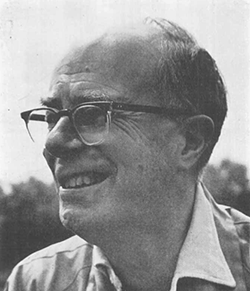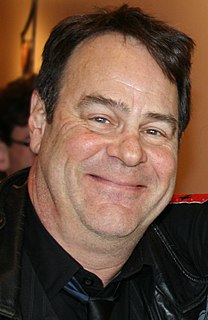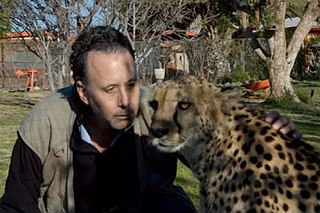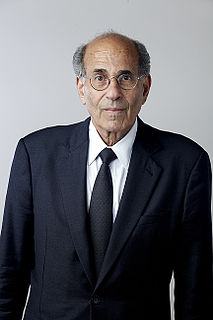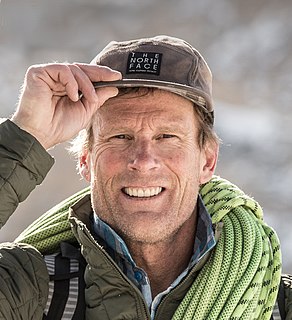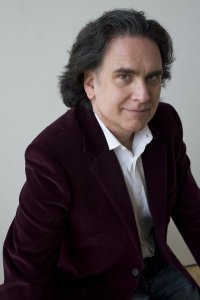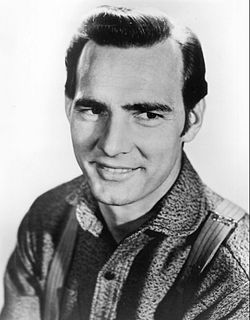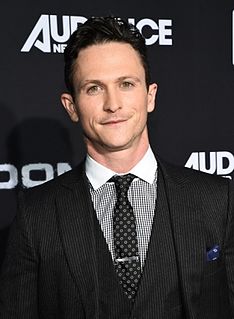Top 1200 Species Quotes & Sayings - Page 3
Explore popular Species quotes.
Last updated on November 21, 2024.
Darwin's theory of evolution is a framework by which we understand the diversity of life on Earth. But there is no equation sitting there in Darwin's 'Origin of Species' that you apply and say, 'What is this species going to look like in 100 years or 1,000 years?' Biology isn't there yet with that kind of predictive precision.
Ecology also teaches that all life on earth can be viewed as a competition among species for the solar energy captured by green plants and stored in the form of complex carbon molecules. A food chain is a system for passing those calories on to species that lack the pant's unique ability to synthesize them from sunlight.
The fundamental problem in the origin of species is not the origin of differences in appearance, since these arise at the level of the geographical race, but the origin of genetic segregation. The test of species-formation is whether, when two forms meet, they interbreed and merge, or whether they keep distinct.
Several times in Earth's history, rapid global warming occurred, apparently spurred by amplifying feedbacks. In each case, more than half of plant and animal species became extinct. New species came into being over tens and hundreds of thousands of years. But these are time scales and generations that we cannot imagine.
The evolutionary vision is agnostic in regard to systems in the universe of greater complexity than those of which human beings have clear knowledge. It recognizes aesthetic, moral, and religious ideas and experiences as a species, in this case of mental structures or of images, which clearly interacts with other species in the world's great' ecosystem.
I don't hold animals superior or even equal to humans. The whole case for behaving decently to animals rests on the fact that we are the superior species. We are the species uniquely capable of imagination, rationality, and moral choice - and that is precisely why we are under an obligation to recognize and respect the rights of animals.
We [people] have the power to destroy ourselves as well as the environment. As a species we love what I'd call brinks-person-ship, going right to the edge of disaster and somehow managing to pull back and recover. But my bet is still on the creative and playful and positive in the species. I think we will manage to survive and gradually turn things around.
It has been asserted that there is a separate species on the earth to correspond with each one of the stars. Now if the earth provides in each species a focus for the action of each star, why may not a similar provision be made among other heavenly bodies that are subject to the action of their fellows?
To many people, 'biodiversity' is almost synonymous with the word 'nature,' and 'nature' brings to mind steamy forests and the big creatures that dwell there. Fair enough. But biodiversity is much more than that, for it encompasses not only the diversity of species, but also the diversity within species.
One must believe that every living thing whatsoever must change insensibly in its organization and in its form... One must therefore never expect to find among living species all those which are found in the fossil state, and yet one may not assume that any species has really been lost or rendered extinct.
A large animal needs a large area. If you protect that area, you're also protecting thousands of other plants and animals. You're saving all these species that future generations will want - you're saving the world for your children and your children's children. . . . The destruction of species is final. If you lose a species, you lose the genes, you lose all the potential drugs and potential foods that could be useful to the next generations. The ecosystems will not function as they have.
Each of these [bacterial] species are masterpieces of evolution. Each has persisted for thousands to millions of years. Each is exquisitely adapted to the environment in which it lives, interlocked with other species to form ecosystems upon which our own lives depend in ways we have not begun even to imagine.
The astounding variety of foods on offer in the modern supermarket obscures the fact that the actual number of species in the modern diet is shrinking. For reasons of economics, the food industry prefers to tease its myriad processed offerings from a tiny group of plant species, corn and soybeans chief among them.
We're at risk of losing this iconic species for all time. Once it's stripped of its natural instincts, it's no longer a tiger. But there's a lot of species like that. The more intriguing thing, throughout Asia, a lot of these countries are selling off their jungle-and-forest rights for oil and for paper-and-pulp companies.
Man makes history; woman is history. The reproduction of the species is feminine: it runs steadily and quietly through all species, animal or human, through all short-lived cultures. It is primary, unchanging, everlasting, maternal, plantlike, and cultureless. If we look back we find that it is synonymous with life itself.
Most species do their own evolving, making it up as they go along, which is the way Nature intended. And this is all very natural and organic and in tune with mysterious cycles of the cosmos, which believes that there's nothing like millions of years of really frustrating trial and error to give a species moral fiber and, in some cases, backbone.
Could it be that the atomic isolation of the husband and wife nucleus with an orbiting child or two is in fact a culturally imposed aberration for our species? As ill-suited to our evolved tendencies as corsets, chastity belts, and suits of armor? ...a distorted and distorting family structure inappropriate for our species?
It's partly the fault of the institutions of education. But it's partly the decision to be relieved of responsibility. Literature is simply the most focused form of the demands on the evolution of the species. It imposes a certain responsibility, moral, ethical and esthetic responsibility, and the species simply doesn't want to oblige.
Two forms or species are sympatric, if they occur together, that is if their areas of distribution overlap or coincide. Two forms (or species) are allapatric, if they do not occur together, that is if they exclude each other geographically. The term allopatric is primarily useful in denoting geographic representatives.
If we consider the superiority of the human species, the size of its brain, its powers of thinking, language and organization, we can say this: were there the slightest possibility that another rival or superior species might appear, on earth or elsewhere, man would use every means at his disposal to destroy it.
Power over seems to be driving our very young species into a ditch because it's from an old competitive, "there may not be enough" kind of framework of scarcity. Power with is thinking abundantly as opposed to fearfully. Power with is hopefully where we're going - and where we need to go as a species in order to survive.
As a species, we're always seeking out authenticity. We're dying for authenticity. We smell it immediately, and we also smell even the slightest riff of somebody who's not completely true to who they are. We have that ability because, as a species, we have organized around stories. We tell them and we subscribe to them.
An Individual, whatever species it might be, is nothing in the Universe. A hundred, a thousand individuals are still nothing. The species are the only creatures of Nature, perpetual creatures, as old and as permanent as it. In order to judge it better, we no longer consider the species as a collection or as a series of similar individuals, but as a whole independent of number, independent of time, a whole always living, always the same, a whole which has been counted as one in the works of creation, and which, as a consequence, makes only a unity in Nature.
Humanity is part of nature, a species that evolved among other species. The more closely we identify ourselves with the rest of life, the more quickly we will be able to discover the sources of human sensibility and acquire the knowledge on which an enduring ethic, a sense of preferred direction, can be built.
In the long run, the only solution I see to the problem of diversity is the expansion of mankind into the universe by means of green technology... Green technology means we do not live in cans but adapt our plants and our animals and ourselves to live wild in the universe as we find it... When life invades a new habitat, she never moves with a single species. She comes with a variety of species, and as soon as she is established, her species spread and diversify further. Our spread through the galaxy will follow her ancient pattern.






